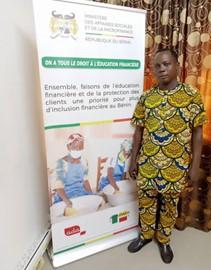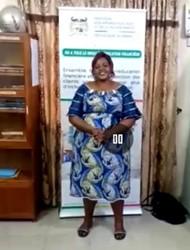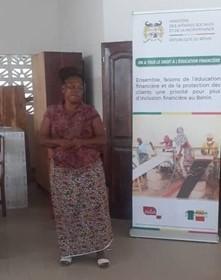
ADA promotes financial inclusion in Benin through financial education

In Benin, Decentralised Financial Systems (DFSs), also known as DeFi systems or microfinance institutions, are faced with many cases of over-indebted clients who can no longer manage to repay their loans. This is partly because clients do not have the knowledge to understand the products offered to them by DFSs, and partly because these products do not meet their needs. This situation not only exposes DFSs to financial hardship—it jeopardises client trust. Financial education is a way to help DFSs recover and build the confidence of their clients, thereby contributing to the financial inclusion of the most at-risk individuals. Financial education means giving clients the information they need to understand the products and services on offer with full transparency so they can make an informed decision about what best suits their needs.
Financial education as a priority in the national financial inclusion strategy
In 2022, financial education was defined as one of the pillars of the 2022-2027 National Financial Inclusion Strategy in Benin. Against this background, the Ministry of Social Affairs and Microfinance (MASM) set up a pilot project for financial education and protection of clients with regard to decentralised financial systems through centres for social advancement to help DFSs bounce back and protect their clients from over-indebtedness. The project intends to empower centres for social advancement (CPSs) and Social Affairs and Microfinance Regional Offices (DDASM), and to provide the Ministry with the necessary tools for fulfilling its mission of providing financial education to the population.
ADA’s financial and technical contribution
Because of its expertise in inclusive finance, ADA was asked to support the project, which it is co-financing to the tune of €70,000, i.e. a little more than 50%, the rest being financed by the Ministry itself and the Canadian organisation DID (Desjardins International Development) through the ADAPAMI project, whose goal is to support the development, professionalisation and rehabilitation of microfinance. More concretely, ADA provided training on the basics of inclusive finance and monitored the pilot project with the Ministry until the project drew to a close at the end of 2022.
The Ministry of Social Affairs and Microfinance relies on centres for social advancement to promote financial education
Centres for social advancement (CPSs) are decentralised bodies of the Ministry of Social Affairs and Microfinance (MASM) whose mission is to alert and support individuals who are socially at risk (e.g. unemployed, work accidenta, illness, death, old age, loss of autonomy, etc.). They therefore have a good understanding of the field and the people. The pilot project aims to train CPSs to become centres for financial education and advice to DFS clients and prospects in addition to their social mission. Five of the 85 CPSs in the country were chosen for the project.
Step-by-step advancement
May 2022: training for CPSs and the DDASM on the basics of inclusive finance
The project started with the training of representatives from the five CPSs, the Ministry and the Regional Offices on the basics of inclusive finance. The training course was hosted by Jean-Paul Kiendrebeogo, Technical Advisor at ADA, who reviewed the key concepts of inclusive finance and financial inclusion, explained loans, savings and budgets, introduced the financial inclusion strategy in Benin and reviewed the regulatory and legal frameworks to which microfinance institutions are subject. The session ended with some recommendations for everyone. The CPSs and the Regional Offices recommend that all illegal savings and loan organisations be catalogued in the field and that their beneficiaries be directed to legal registered organisations, such as licensed microfinance institutions. Beyond the presentation of key concepts in inclusive finance, the training course provided a framework for reflection and exchange between these players concerning future collaboration.
Jean-Paul Kiendrebeogo, Technical Advisor at ADA based in Burkina Faso:
“The training course in inclusive finance that I conducted for the CPSs enabled them to familiarise themselves with this new environment and gave them the tools to become financial educators for DFS clients and prospects.”
June 2022: financial education training for CPSs and Regional Offices
The CPSs and the Regional Offices then received training from the Canadian organisation Desjardins International Development (DID) to learn the techniques for running a financial education course. For example, for a group to function properly, its members must have a shared goal and each be responsible for a well-defined task. Using written material such as a flipchart and using body language to help participants grasp the concepts is also recommended.
The course ended with two days of field experience during which the newly trained CPS agents were able to apply their techniques in workshops on specific themes (keeping money in a safe place, managing money well, living better within one's means, getting loans easily from microfinance institutions, selling better with informed choices and honouring commitments in one's family and business) aimed at a specific target audience (with a formal education or without).
October 2022: Training of CPSs on social performance management and consumer protection with regard to financial services
This course supplemented the two previous courses, providing participants (CPSs, the Regional Offices and the Ministry) with the keys to understand the importance of social performance and consumer protection. Social performance is the overall effect that microfinance activities have on their clients’ social conditions, including living standards, housing, health and education. Consumer protection is defined by the SMART Campaign - recognised certification in the financial sector for the protection of clients - as the set of norms, standards and laws that guide and govern the behaviour of businesses towards their clients. This is why it is important for microfinance institutions to take them into account - both parameters constitute criteria for impact investors to choose from when financing the activities of microfinance institutions.
Financial education course by the CPSs for clients and prospects
Once trained, the CPSs went into the field with a questionnaire to figure out what people need (microfinance clients and prospects). On the basis of this information, they formed groups according to the training modules. Awareness-raising sessions were also organised for clients and non-clients on their rights and duties.
To enable the CPSs to conduct the courses properly, the ADAPAMI project provided them with a number of tools, including a trainer's guide, a participant's workbook, a kit for those with no formal education, a glossary to explain the different terms used throughout the course, and promotional materials (posters, leaflets and roll-ups).
More specifically, the financial education courses were organised around the six workshops taught to the CPSs during their training, each dealing with a specific theme:
- Keeping money in a safe place
- Managing money well
- Living better within one's means
- Getting loans easily from microfinance institutions
- Selling better with informed choices
- Honouring commitments in one's family and business.
In total, 60 training courses were planned through the end of 2022 via these five CPSs to train 1,800 beneficiaries. By the end of November, 53 training courses had already been taught and 1,581 beneficiaries had been trained, including 240 men and 1,341 women. Additionally, 3,500 of the 6,000 clients targeted by the project had already been made aware of their rights and duties when using financial services. In early 2023, ADA will assess the project and define the lessons learnt.
Participants' feedback

Firmin Adanminakou, agent at the General Directorate for Microfinance (DGM):
“This project is an opportunity for the DGM to fully play its supervisory role and reach people at the grassroots level more effectively. It demonstrated the population's dire need for financial education. The five CPSs in the pilot area now have the skills to help microfinance clients and prospects to use financial services. The enthusiasm and support in the field confirm that CPSs are one of the best ways to educate people financially and to help their businesses successfully generate income.”

Flore Houssou, a merchant who attended the training courses on "Keeping money in a safe place" and “Getting loans easily from DFSs”:
“I didn't know how to manage my money. I handed over the profit I made from my business to a mobile banker in order to save. When the money was used, it was really hard for us. But the CPS taught me about various places to save safely, and now I know that I can go and withdraw my money any time if I need to. After the training course, I withdrew the money I gave to the mobile banker and opened a savings account with a microfinance institution like the CPS taught us.”

Martine Ganse, a retailer who attended the training course on "Managing money well”:
“During the training course, I felt like the CPS was describing me. I was mismanaging my money without knowing it. For example, when I had to go to ceremonies, I spent at least 5,000 [CFA francs] on manicures and pedicures, not to mention my hair. Now I spend my money differently. I’ve started to manage my priorities more and I am even saving money.”